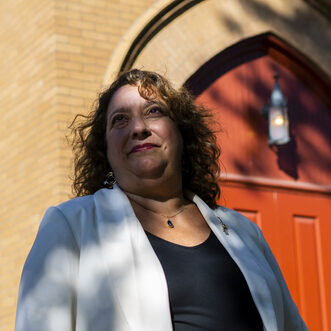Prayer Leaders
In the Jewish liturgical setting, an individual is designated to lead the prayer service. Sometimes this person is a professional Rabbi or Cantor, sometimes they are a volunteer who has the necessary skills.
The person leading the service is sometimes referred to using the terms ba’al t’fillah (prayer leader) or shaliach tzibbur (sh’li·aḥ tzibbur, representative of the congregation).
The acronym shatz is also used, derived from the initial letters of the words shaliach tzibbur. The feminine forms are ba’alat t’fillah and sh’lichat tzibbur or in non-binary Hebrew ba’alet t’filah and sh’lichet tzibbur.
The individual honored to lead the congregation in prayer, whether professional or volunteer, ideally should be skilled in singing and well-versed in TorahRefers to the first five books of the Hebrew Bible, the Tanakh, also called the Five Books of Moses, Pentateuch or the Hebrew equivalent, Humash. This is also called the Written Torah. The term may also refer to teachings that expound on Jewish tradition. Read more learning and the liturgy. That individual should also have fine moral character and exemplify the highest standards of ethical behavior.
These attributes, prescribed in the TalmudReferring to one of two collections, the Jerusalem and Babylonian Talmuds, edited in the 6th century, that contains hundreds of years of commentary, discussion, and exploration of the ideas in the Mishnah. One could describe it as Mishnah + Gemara = Talmud Read more at BT Taanit 16a, can and ought to serve us well in assigning the role of prayer leader in our communities.
Nusaḥ
Any discussion of the role of prayer leader must also include some reference to the issue of nusaḥ (nusach).
The term nusaḥ refers to musical modes that may change according to the hour of the day, the time of the year, and the specific part of the service being chanted. For example, the way the Amidah on Shabbat morning is chanted is different from the way the Amidah is chanted on a weekday morning.
Existing at the confluence of law and custom, nusaḥ sets the tone for traditional worship and should be considered an indispensable part of the service.
Music and chanting have always been part of the Jewish liturgical tradition. The psalms were early songs of prayer to God. The Torah itself has always been chanted according to a special and precise cantillation system, not merely declaimed aloud.
The prayer service too is characterized by special melodies and musical modes deemed appropriate for specific parts of the service.
Trained leaders (Cantors, Rabbis, volunteers) help educate a community in the use of proper nusaḥ for different liturgical settings and moments. They can also enhance the service by knowing when and how to introduce congregational melodies that are well suited to the particular nusaḥ and mood of a given service.
Adapted with permission from The Observant Life.
Authors
-

Rabbi Dr. Karen G Reiss Medwed, is Teaching Professor emerita at Northeastern University. She serves as Interim Vice Provost, Academic Affairs and Initiatives for HUC-JIR. Dr. Reiss Medwed's scholarship includes digital education, higher education leadership, and faith-based education. Dr. Reiss Medwed was ordained by JTS in 1995, and earned her Ph.D. from New York University's Steinhardt School of Education in Curriculum, Teaching and Learning with a specialization in Jewish education in 2005.
View all posts -

The Observant Life: The Wisdom of Conservative Judaism for Contemporary Jews distills a century of thoughtful inquiry into the most profound of all Jewish questions: how to suffuse life with timeless values, how to remain loyal to the covenant that binds the Jewish people and the God of Israel, and how to embrace the law while retaining an abiding sense of fidelity to one’s own moral path in life. Written in a multiplicity of voices inspired by a common vision, the authors of The Observant Life explain what it means in the ultimate sense to live a Jewish life, and to live it honestly, morally, and purposefully. The work is a comprehensive guide to life in the 21st Century. Chapters on Jewish rituals including prayer, holiday, life cycle events and Jewish ethics such as citizenship, slander, taxes, wills, the courts, the work place and so much more.
View all posts







